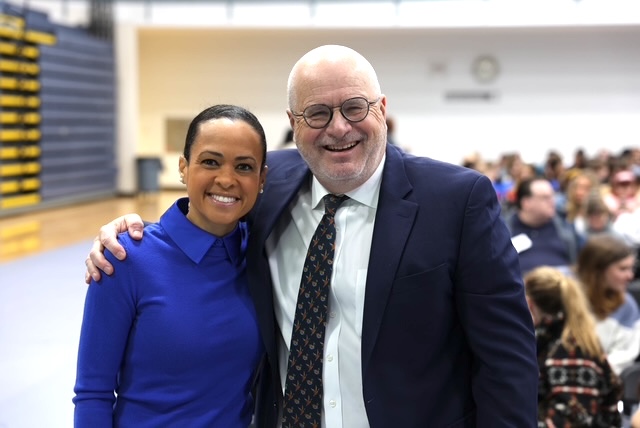The Rich Toss Aside Technology
December 3, 2019

Years ago, I dreamed of a world in which technology took over all the chores that were soul-crushingly boring and freed us to be more fully human, paying more attention to creativity and compassion and relationship. Then pessimism slid back, and I worried that the wealthy would take control of technology. Access would be granted only to an elite sliver of the populace. The rest of us would stumble along with notebooks (the three-ring sort) and Sharpies.
Sure enough, those with sufficient money proceeded to create monopolies, buy up independent media, and dictate our lifestyles.
But something else happened, too: People with nothing else demanded, and managed to procure, smartphones. When I was in Haiti, I saw people lined up outside the hospital, waiting to charge their phones at the only place with electricity. An immigrant from the Middle East recently, scathingly informed me that the United States does not know what poverty is: “Here, even people who are homeless have iPhones.”
And now, in the suspense thriller that is our relationship with technology, comes a new twist.
According to a recent report from WGSN, a trend forecaster, individuals with money (referred to as HNWIs, in a coy signal that conveys their high net worth without repeating the words ad nauseam) are forking over a morsel of that net worth to avoid technology. As the rest of us watch our homes, cars, and personal responses being automated, HNWIs are seeking out services and experiences that are stripped of screens and smoothed by human beings. IRL.
Granted, people with money have always leaned hard on those who have less. How tame the adventures would have been, had Lord Peter Wimsey not had his valet, Batman his butler, Mrs. Bradley her chauffeur. But this is a more counterintuitive shift. As a New York Times article on the de-leveling of the digital notes, “Once the internet became the primary place where our identities are forged and performed, it was inevitable that some people would want to pay their way out of the panopticon—that escape from the very services we lusted after in recent memory would become a premium good.”
And so, those with the cash to bankroll private and human-mediated activity are ignoring their devices. Instructing their nannies to keep the children away from screens. Sending said children to device-free schools. These parents may not face the same economic pressures as the rest of us, but they have heard enough about digital burnout and the stress of ceaseless distractions to customize a life that is free of them.
What the rich are smart enough to want back: Intimacy. Engagement. Relationship, even the shallow sort forged over a financial transaction. Bespoke, customized interactions as well as products. The delights of surprise, mystery, and spontaneity.
What the rich can afford to spurn: The frustration of endless automated phone trees that loop you right back to the main menu. The fragmentation of their (or their children’s) attention. The loss of focus. The risk of identity theft. The loss of privacy. The pressure of 24/7 emails demanding response. The collection of enough details to build a mini-me who will live inside corporate databases, telling them what we value, believe, need, and want; how we make decisions; who or what influences us.
The new luxury is marked not by opulence, WGSN reports, but by the texture and individualization of experience. HNWIs seek human contact and define “in-the-moment experiences as the ultimate form of luxury.” Purchases must be graced by emotional connection, not reduced to efficient button pushing. After all, only another human being can cater, indulge, and admire without being programmed (at least overtly) to do so.
For their ample leisure time, grown-ups with money are taking their cue from Millennials, who saw their parents work long hours hunched over keyboards then come home and slump in front of yet another screen. Life is too short, and job security is no longer guaranteed anyway, the Millennials decided. Why not live a little—especially when it comes to food and travel? The wealthy have always been gourmands, and they have always sought out exciting travel—safaris, camel rides across the Gobi Desert, luxury climbs up Everest with porters to fix exquisite meals and make up the cots with fresh linens. Now, schooled by the young, they are ramping it up. While the rest of us pore over online reviews, click eagerly on Photoshopped photos of accommodations, and take virtual walks through possible dream destinations, those with money hire high-end travel design agencies to plan a mystery trip for them. Part of the fun is packing (or having someone pack for them) from a customized checklist, then being surprised and delighted as the trip unfolds. Robots can randomize, but they cannot surprise.
It seems Thorsten Veblen’s famous observation still holds true: The very poor and the very rich have more in common with each other, behaviorally, than they have with the middle class. Nannies in Silicon Valley keep their charges away from screens, and so do grandmothers in poor neighborhoods who are babysitting while their daughters hunt for jobs. But the grandmothers cannot afford to buy, let alone block the use of, a smartphone apiece and a laptop and Wi-Fi and streaming services. The difference is the power of choice.
We could all shun technology, turn off devices, seek human interaction. But those of us in the fraught middle would risk our jobs, cut ourselves off from information, lose touch with friends and colleagues. That is a price we cannot afford to pay, and so we fix our eyes on screens and click all day and night, interacting with soulless chatbots that do not make us feel special.
Those with money, meanwhile, are buying themselves time to think, feel, savor. They are landing just where I once hoped we all would. As Milton Pedraza, the guru of research into the top tier’s desires, told the New York Times last March, “The human is very important right now.”
But it has become a luxury.







